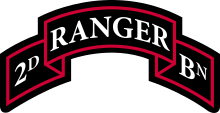2d Ranger Battalion
| 2nd Battalion, 75th Ranger Regiment | |
|---|---|

2nd Ranger Battalion shoulder sleeve insignia
|
|
| Active | 1943–45, 1974–present |
| Country |
|
| Branch |
|
| Type | Specialized light infantry |
| Role | Special operations |
| Size | Battalion |
| Part of |
|
| Garrison/HQ | Joint Base Lewis-McChord, U.S. |
| Nickname(s) | Army Rangers |
| Colors | Black and Gold |
| Engagements | |
| Commanders | |
| Notable commanders |
Wayne A. Downing |
| Insignia | |
| Distinctive unit insignia | |
| Unit beret flash | |
Operation Urgent Fury
Operation Just Cause
War on Terror
The 2nd Ranger Battalion, currently based at Joint Base Lewis-McChord south of Seattle, Washington, United States, is the second of three ranger battalions belonging to the United States Army's 75th Ranger Regiment.
On 1 April 1943 the 2nd Ranger Battalion was formed at Camp Forrest, Tennessee, along with the 5th Ranger Battalion. Both battalions were officially activated in September 1943 and shipped to Great Britain where they were prepared for Operation Overlord as part of six Ranger battalions of the Second World War.
On 6 June 1944, Dog, Easy, and Fox Companies, commanded by Lt. Colonel James Rudder, landed at Pointe du Hoc from LCA landing craft and specially modified DUKW "Ducks" operated by the Royal Navy. The 225 Rangers had set off from Britain to launch an assault upon the cliffs overlooking the English Channel. In order to augment the strength of the 2nd Battalion, members of what was formerly the 29th Rangers were assigned as well.
Several landing craft containing Rangers and supplies capsized in the stormy waters and many Rangers drowned due to heavy equipment, but others were saved and hoisted into other DUKWs to participate in the attack. The Rangers had planned to land at the base of the cliffs at 0600 hours, however, because of a navigational error, they landed nearly an hour late. This cost the lives of more Rangers as well as the element of surprise. During the attack, the 190 remaining Rangers scaled the cliffs utilizing rope ladders, but only 90 Rangers were still able to bear arms after two days of relentless fighting. During the assault, 2nd Battalion managed to disable a battery of 155mm French artillery captured by the Germans, which was their primary objective. These guns were to be aimed at Utah Beach, however, the Rangers prevented their use, saving American lives on the shores of Normandy.
...
Wikipedia


